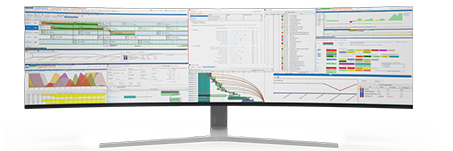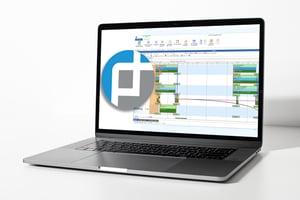FLEXIBLE PRODUCTION LINES
With technological advancements and ever-evolving customer demands, the need for flexible production lines has become essential. Supply Chain Managers in medical manufacturing facilities find themselves grappling with the challenge of ensuring efficiency and agility in production processes.
In this blog, we look into the critical role of integrated scheduling, with a specific focus on the seamless collaboration between PlanetTogether and leading ERP, SCM, and MES systems like SAP, Oracle, Microsoft, Kinaxis, and Aveva.

The Challenge of Flexible Production Lines
The concept of flexible production lines involves the ability to adapt quickly to changes in demand, product specifications, and regulatory requirements. In the medical manufacturing sector, where precision, quality, and compliance are non-negotiable, achieving flexibility without compromising these elements is a complex task.
Supply Chain Managers face several challenges in managing flexible production lines, such as:
Demand Variability: Fluctuations in market demand for medical products can be unpredictable, requiring a production environment that can quickly adjust to changes.
Regulatory Compliance: Stringent regulations in the medical industry necessitate meticulous adherence to quality standards and documentation, adding complexity to scheduling.
Product Customization: As medical products become more tailored to specific patient needs, the ability to accommodate product variations and customization is crucial.
Supply Chain Disruptions: Events like raw material shortages, transportation delays, or unforeseen disruptions can impact the entire supply chain, requiring prompt adjustments in production schedules.
Integrated Scheduling: A Key to Flexibility
Effective scheduling lies at the heart of managing flexible production lines. It is the linchpin that connects various stages of the manufacturing process, ensuring optimal resource utilization, reduced lead times, and adherence to quality standards. In this context, integration between advanced scheduling tools like PlanetTogether and established ERP, SCM, and MES systems plays a pivotal role.
![]()

The Power of PlanetTogether
PlanetTogether is a leading Advanced Planning and Scheduling (APS) solution that empowers manufacturing facilities with real-time visibility, detailed planning, and scenario analysis. Its capabilities align seamlessly with the requirements of flexible production lines in the medical manufacturing sector.
Key Features of PlanetTogether
Scenario Planning: Allows Supply Chain Managers to simulate different scenarios, enabling proactive decision-making in response to changing conditions.
Real-time Visibility: Provides a centralized view of the entire production process, allowing quick identification of bottlenecks, underutilized resources, and areas for improvement.
Resource Optimization: Optimizes the allocation of resources, including personnel, machines, and materials, to ensure maximum efficiency.
Finite Capacity Scheduling: Ensures that production schedules consider the finite capacity of resources, preventing overcommitment and avoiding production delays.

Integration with ERP, SCM, and MES Systems
To unleash the full potential of PlanetTogether and address the complexities of flexible production lines, integration with core business systems becomes imperative. Let's explore how this integration can enhance scheduling capabilities when coupled with leading ERP, SCM, and MES systems.
SAP
Integration with SAP brings about a cohesive flow of information across the entire supply chain. The seamless exchange of data between SAP and PlanetTogether enables:
Accurate Demand Forecasting: PlanetTogether utilizes historical data and real-time inputs to enhance demand forecasting accuracy, aligning with SAP's robust demand planning capabilities.
Real-time Inventory Management: Integration ensures that inventory levels are continuously updated, preventing stockouts and excess inventory, thus contributing to optimized scheduling.
Quality Management: Synchronized data exchange supports adherence to SAP's quality management processes, ensuring that production schedules align with stringent quality standards.
Oracle
Oracle's ERP system, when integrated with PlanetTogether, amplifies scheduling capabilities:
End-to-End Visibility: The integration facilitates seamless visibility into the entire production lifecycle, enabling Supply Chain Managers to make informed decisions based on real-time data.
Agile Production Planning: Combining Oracle's production planning with PlanetTogether's advanced scheduling allows for agile responses to changing demand, minimizing lead times and maximizing resource utilization.
Compliance Assurance: Integration ensures that production schedules align with Oracle's compliance and regulatory requirements, promoting a culture of quality assurance.
Microsoft Dynamics
Microsoft Dynamics ERP, when coupled with PlanetTogether, enhances the scheduling process:
Collaborative Decision-making: Integration enables collaborative decision-making by providing a unified platform for communication and data sharing, fostering synergy between different departments.
Efficient Resource Management: Microsoft Dynamics' resource management capabilities are complemented by PlanetTogether's advanced scheduling, ensuring that resources are allocated optimally.
Scalability: The integrated solution is scalable, accommodating the growth of the medical manufacturing facility while maintaining scheduling efficiency.
Kinaxis
Integration with Kinaxis provides Supply Chain Managers with a holistic view of the supply chain, enhancing scheduling through:
Rapid Response Planning: Kinaxis' RapidResponse, coupled with PlanetTogether, enables swift responses to changes in demand or supply, ensuring that production schedules remain adaptable.
Scenario Analysis: The integrated solution supports detailed scenario analysis, allowing Supply Chain Managers to assess the impact of various factors on production schedules and make informed decisions.
Cross-functional Collaboration: Integration fosters collaboration across different functions, streamlining communication and ensuring that scheduling decisions align with overall business goals.
Aveva
Integration with Aveva MES enhances the scheduling process by:
Real-time Production Monitoring: Aveva MES's real-time monitoring capabilities are complemented by PlanetTogether's advanced scheduling, ensuring that any deviations from the schedule are promptly identified and addressed.
Quality Assurance: Integration supports seamless synchronization with Aveva MES's quality management processes, guaranteeing that production schedules adhere to stringent quality standards.
Optimized Workflows: The integrated solution optimizes workflows by aligning scheduling decisions with the broader context of manufacturing execution, minimizing disruptions and delays.
Overcoming Challenges with Integration
While the benefits of integrating PlanetTogether with ERP, SCM, and MES systems are evident, challenges may arise during the implementation process. Addressing these challenges is essential for a smooth and successful integration:
Data Standardization: Ensure that data formats and standards are consistent across all integrated systems to facilitate seamless data exchange.
Communication Protocols: Establish clear communication protocols between systems to avoid data discrepancies and ensure real-time updates.
User Training: Provide comprehensive training to users on the integrated system to maximize utilization and minimize errors.
Continuous Monitoring: Implement a robust monitoring system to detect and resolve any integration issues promptly.
In the world of medical manufacturing, flexible production lines are not just a luxury—they are a strategic imperative. Integrated scheduling, powered by the synergy between PlanetTogether and leading ERP, SCM, and MES systems, offers Supply Chain Managers a robust solution to navigate the complexities of flexible production.
As technology continues to advance, the integration landscape will evolve, opening up new possibilities for further enhancing scheduling capabilities. By staying abreast of these developments and embracing the full potential of integrated scheduling, medical manufacturing facilities can position themselves as agile, efficient, and responsive entities in an ever-changing industry.
Topics: PlanetTogether Software, Accurate Demand Forecasting, Integrating PlanetTogether, Real-time Production Monitoring, End-to-End Visibility, Collaborative Decision-Making, Rapid Response Planning




















LEAVE A COMMENT